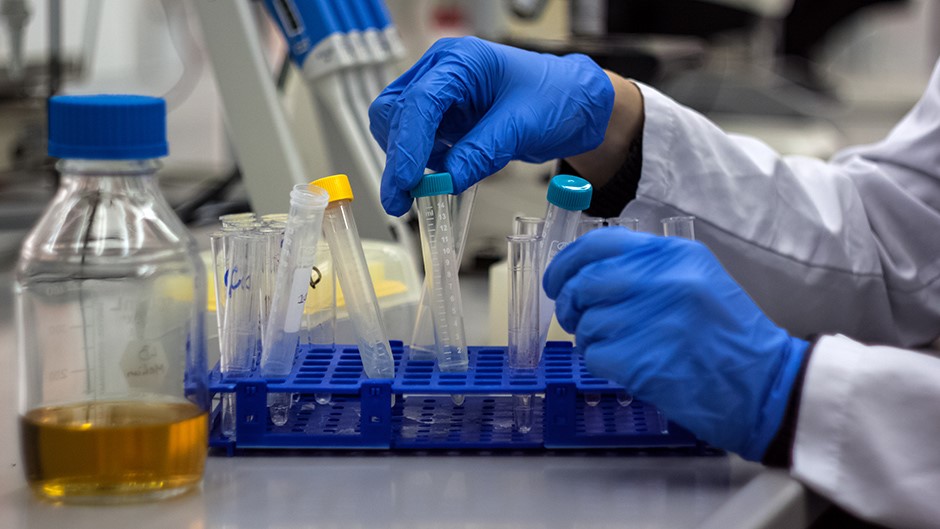
Synthetic Biology Market by Products (Synthetic DNA, Synthetic Genes, Chassis Organisms, Oligonucleotides, Cloning Technologies Kits, and Enzymes), by Technology (Gene Synthesis, Genome Engineering, Bioinformatics, and Bio-sensors), and by Applications (Industrial Biotechnology, Healthcare, and Chemicals) – Global Opportunity Analysis and Industry Forecast – 2024 – 2030
Synthetic Biology Market Overview
The global Synthetic Biology Market size was valued at USD 15.23 billion in 2023 and is predicted to reach USD 66.29 billion by 2030 with a CAGR of 23.4% from 2024-2030. The synthetic biology (Synbio) market refers to the commercial aspects of the field of synthetic biology that involves the design and construction of new biological systems as well as the re-design of existing natural biological systems for useful purposes. This market includes a wide range of applications across various industries such as pharmaceuticals as it plays a crucial role of drug discovering, whereas in agriculture, it helps to create genetically modified corps, and in chemicals, it helps to produce bio-based chemicals. Furthermore, in energy, it helps to produce bio fuels, and in environmental, it utilizes engineered organisms for bioremediation.
The synthetic biology industry is characterized by rapid technological advancements and growing investments aimed at harnessing biological systems for innovative solutions. Genetic engineering, DNA synthesis, bioinformatics, and the development of different biotechnological products and processes are the key activities within this market.
Market Dynamics and Trends
The increasing adoption of synthetic biology formulations in healthcare sector fuels the growth of the market as it enables the development of tailored gene therapies and customized treatments for complex diseases such as cancer and cardiovascular diseases. For instance, in June 2024, the University of Texas MD Anderson Cancer Center collaborated with Rice University to advance the cancer research and treatment through the integration of genome engineering principles and technologies. Furthermore, in September 2023, the Osaka University developed a gene editing technique known as NICER that aims to address the limitations of the widely used CRISPR/Cas9 gene editing technique and fix mutations that cause genetic disease. These innovative inventions enhance the treatment capabilities and boost the investment in synthetic biology applications that fuels the expansion of the market.
Moreover, the rising research and development (R&D) efforts by major companies such as Vertex Pharmaceuticals Incorporated, Fermbox Bio Pvt Ltd, and others towards synthetic biology further fuels the growth of the market. These efforts include substantial investments in advanced genome editing technologies such as CRISPR-Cas9 that aims to improve the precision and efficiency of genetic modifications. The focus also extends to waste transformation where synthetic biology is employed to develop systems that break down or recycle waste materials.
For instance, in May 2024, Fermbox Bio launched a Synbio product pipeline cellulosic enzyme cocktail to transform agricultural waste into 2G ethanol. Moreover, in December 2023, Vertex Pharmaceuticals developed exa-cel a gene-editing therapy for the treatment of sickle cell disease. These advancements are driving market expansion by broadening healthcare options and advancing biotechnology.
Additionally, the integration of synthetic biology in the food and beverage industry is propelling the growth of the synthetic biology sector as it enables the production of innovative ingredients and sustainable alternatives such as engineered yeasts and bacteria that are utilized to enhance flavors, improve nutritional profiles, and create advanced food additives.
For instance, in February 2024, Novonesis launched Innova Delta a yeast technology that aims to provide an efficient producer pathway for corn ethanol plants, allowing them to generate renewable identification numbers (RINs) for volumes of ethanol that do not qualify under legacy regulations.
However, the high upfront costs required for developing and deploying synthetic biology technologies along with the time-consuming nature of research and development activities hinders the growth of the market.
On the contrary, the integration of artificial intelligence (AI) with synthetic biology is revolutionizing the design and optimization of biological systems that creates future opportunities of the market growth. AI enhances the precision of genetic engineering, accelerates the development of new biological pathways, and improves the prediction of organism behavior. For instance, in February 2024, Ginkgo Bioworks acquired Reverie Labs to accelerate the drug discovery by using AI tools. This integration helps to unlock new possibilities in synthetic biology industry that drives innovation and expansion of market potential.
Market Segmentations and Scope of the Study
The synthetic biology market report is segmented on the basis of products, technology, application and region. On the basis of products, the market is divided into synthetic DNA, synthetic genes, chassis organisms, oligonucleotides, cloning technologies kits, and enzymes. On the basis of technology, the market in segmented into gene synthesis, genome engineering, bioinformatics, and bio-sensors. Genome engineering is further segmented into o CRISPR-Cas9 and TALENs. On the basis of application, the market is classified into industrial biotechnology, healthcare, and chemicals. Industrial Biotechnology is further divided into agriculture, environmental, energy, and food & beverage. Healthcare is further segmented into drug discovery, diagnostics, therapeutics, and pharmaceuticals. Chemicals is further divided into specialty chemicals and bio-based chemicals. Regional breakdown and analysis of each of the aforesaid segments includes regions comprising of North America, Europe, Asia-Pacific, and RoW.
Geographical Analysis
North America holds the dominating share of synthetic biology industry at present and is projected to continue its dominance throughout the forecast period. This is owing to the factors such as the well-established industrial biotechnology sector that leverages synthetic biology for the production of bio-based chemicals, fuels, and materials. As per the latest report of the Biotechnology Innovation Organization (BIO), the U.S. biotech sector nearly generated USD 3 trillion and helped to establish 1,27,000 businesses in 2021 an increase of 11% from 2018. The U.S. biotech sector's success boosts the innovation of synthetic biology in healthcare, agriculture, and sustainability.
Moreover, the presence of key market players such as Ginkgo Bioworks, Agilent Technologies Inc., Thermo Fisher Scientific Inc., and others are further driving the innovation and growth of the market through various strategies including mergers and acquisitions. For instance, in October 2023, Thermo Fisher Scientific acquired Olink to enhance its capabilities in advanced protein biomarker discovery and quantification that strengthen its portfolio in precision medicine and life sciences research.
On the other hand, Asia-Pacific is considered fastest growing region in the synthetic biology industry. This is due to the rapidly growing healthcare sector in countries such as China and India as these countries are investing heavily in advanced medical technologies and biotechnologies to address rising healthcare demands and improve patient outcomes. According to the World Bank Group report 2024, the share of healthcare expenditure of GDP in China stood at 5.4% in 2021 as compared to 4.7% in 2014. Moreover, China’s healthcare expenditure per capita stood at USD 670.5 in 2021 as compared to USD 363.1 in 2014. China's substantial investment in healthcare propels the growth of the synthetic biology industry in the region by facilitating advancements in medical technologies and biotechnological innovations such as personalized medicine and innovative therapies.
Furthermore, the rising government initiatives in countries such as South Korea and Japan are significantly driving the growth of the synthetic biology market share as these governments are implementing strategic policies to support research and development of synthetic biology industry. For instance, in November 2023, the Korean Ministry of Science and ICT launched the National Synthetic Biology Initiative to nurture synthetic biology and enhance innovative capabilities in biomanufacturing sector in South Korea.
Competitive Landscape
The synthetic biology industry comprises of various key players that includes Thermo Fisher Scientific Inc., Merck KGaA, Agilent Technologies Inc., Novozymes A/S, Ginkgo Bioworks, Amyris, Inc., Precigen, Inc., GenScript Biotech Corporation, Twist Bioscience, Synthetic Genomics Inc., and others. These market players are adopting various strategies such as product launch and collaboration to maintain their dominance in market.
For instance, in May 2024, Ginkgo Bioworks partnered with Sojitz Corporation to leverage synthetic biology research and development in creating innovative solutions that address environmental challenges and promote a more sustainable future for Japan's manufacturing industry.
Moreover, in March 2024, Merck partnered with Pearl Bio to discover and develop biologic therapies using synthetic biology techniques. The partnership will focus on creating biologics for the treatment of cancer by leveraging genetically recoded organism (GRO) technology.
Furthermore, in September 2023, Novozymes, launched Vertera ProBite that aims to advance the plant-based meat industry by enhancing texture and enabling more consumer-friendly labels.
Key Benefits
-
The report provides quantitative analysis and estimations of the synthetic biology market from 2024 to 2030, which assists in identifying the prevailing market trends.
-
The study comprises a deep-dive analysis of the current and future synthetic biology market trends to depict prevalent investment pockets in the market.
-
Information related to key drivers, restraints, and opportunities and their impact on the synthetic biology market is provided in the report.
-
Competitive analysis of the key players, along with their market share is provided in the report.
-
SWOT analysis and Porters Five Forces model is elaborated in the study.
-
Value chain analysis in the market study provides a clear picture of roles of stakeholders
Synthetic Biology Market Key Segments
By Products
-
Synthetic DNA
-
Synthetic Genes
-
Chassis Organisms
-
Oligonucleotides
-
Enzymes
By Technologies
-
Gene Synthesis
-
Genome Engineering
-
CRISPR-Cas9
-
TALENs
-
-
Bioinformatics
-
Bio-sensors
By Applications
-
Industrial Biotechnology
-
Agriculture
-
Environmental
-
Energy
-
Food & beverage
-
-
Healthcare
-
Drug discovery
-
Diagnostics
-
Therapeutics
-
Pharmaceuticals
-
-
Chemicals
-
Specialty chemicals
-
Bio-based chemicals
-
By Region
-
North America
-
The U.S.
-
Canada
-
Mexico
-
-
Europe
-
The UK
-
Germany
-
France
-
Italy
-
Spain
-
Denmark
-
Netherlands
-
Finland
-
Sweden
-
Norway
-
Russia
-
Rest of Europe
-
-
Asia-Pacific
-
China
-
Japan
-
India
-
South Korea
-
Australia
-
Indonesia
-
Singapore
-
Taiwan
-
Thailand
-
Rest of Asia Pacific
-
-
RoW
-
Latin America
-
Middle East
-
Africa
-
REPORT SCOPE AND SEGMENTATION:
|
Parameters |
Details |
|
Market Size in 2023 |
USD 15.23 Billion |
|
Revenue Forecast in 2030 |
USD 66.29 Billion |
|
Growth Rate |
CAGR of 23.4% from 2023 to 2030 |
|
Analysis Period |
2023–2030 |
|
Base Year Considered |
2023 |
|
Forecast Period |
2024–2030 |
|
Market Size Estimation |
Billion (USD) |
|
Growth Factors |
|
|
Countries Covered |
28 |
|
Companies Profiled |
10 |
|
Market Share |
Available for 10 companies |
|
Customization Scope |
Free customization (equivalent up to 80 working hours of analysts) after purchase. Addition or alteration to country, regional, and segment scope. |
|
Pricing and Purchase Options |
Avail customized purchase options to meet your exact research needs. |
KEY PLAYERS
-
Thermo Fisher Scientific Inc.
-
Merck KGaA
-
Agilent Technologies Inc.
-
Novozymes A/S
-
Ginkgo Bioworks,
-
Amyris, Inc.
-
Precigen, Inc.
-
GenScript Biotech Corporation
-
Twist Bioscience
-
Synthetic Genomics Inc.




 Speak to Our Analyst
Speak to Our Analyst

































